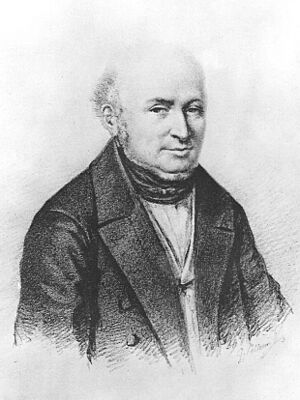Alexandre Boëly facts for kids
Alexandre Pierre-François Boëly (born April 19, 1785 – died December 27, 1858) was a talented French musician. He was a composer, meaning he wrote music. He also played the organ, piano, and viola very well.
Early Life and Musical Journey
Boëly was born in Versailles, France. His family was full of musicians! His father, Jean-François, was a singer called a countertenor at the Sainte-Chapelle in Paris. A countertenor is a male singer who can sing very high notes, like a female soprano. His father also taught harp at the royal court in Versailles.
Alexandre learned music from his father. He also studied with a pianist named Ignaz Ladurner. Ladurner introduced him to the music of famous composers like Bach and Haydn. Boëly loved their music and would later help others discover it too. Besides the piano and organ, he was also a skilled viola player.
A Different Kind of Musician
During the 1800s, a new style of music called the Romantic movement became very popular in Europe. This music was often grand and emotional. However, Boëly preferred the older, more traditional classical style. He thought much of the popular music of his time was not serious enough.
Because of his classical taste, Boëly was often ignored by the main music groups in Paris. He didn't like the patriotic or dramatic opera music that many other composers were writing.
In 1840, Boëly became the organist at a church called Saint Germain l'Auxerrois. He used this chance to play music by older composers who weren't well-known then. These included Frescobaldi, Couperin, and especially Bach. Many people at the time thought Bach's music was too difficult to play or understand.
Later Years and Legacy
Boëly's choice to play serious, older music didn't make him popular. In fact, in 1851, he was fired from his organist job because his playing was considered "too strict" or "austere." He ended up working as a simple piano teacher.
Even though he wasn't famous, Boëly had a small group of close friends who respected him. These friends included other musicians like Marie Bigot, Pierre Baillot, Friedrich Kalkbrenner, and Johann Baptist Cramer.
Boëly might not be well-known to the public, but he was important for French music in the 1800s. He wrote about 300 pieces of music! Many of these were chamber music (music for small groups of instruments) or pieces for piano or organ. He wrote twelve books of practice pieces and four books for organ or piano.
Later in his life, two young, rising musicians, César Franck and Camille Saint-Saëns, sought him out. They looked up to Boëly as someone who kept the noble and pure classical organ tradition alive.
Alexandre Boëly passed away in Paris in 1858 at the age of 73. After a special church service where his student Saint-Saëns played the organ, he was buried at the Montmartre Cemetery.


